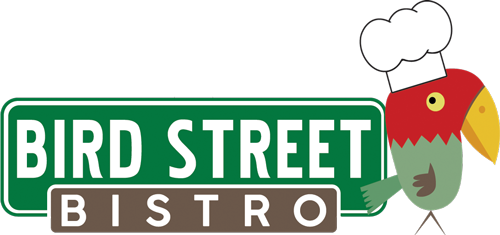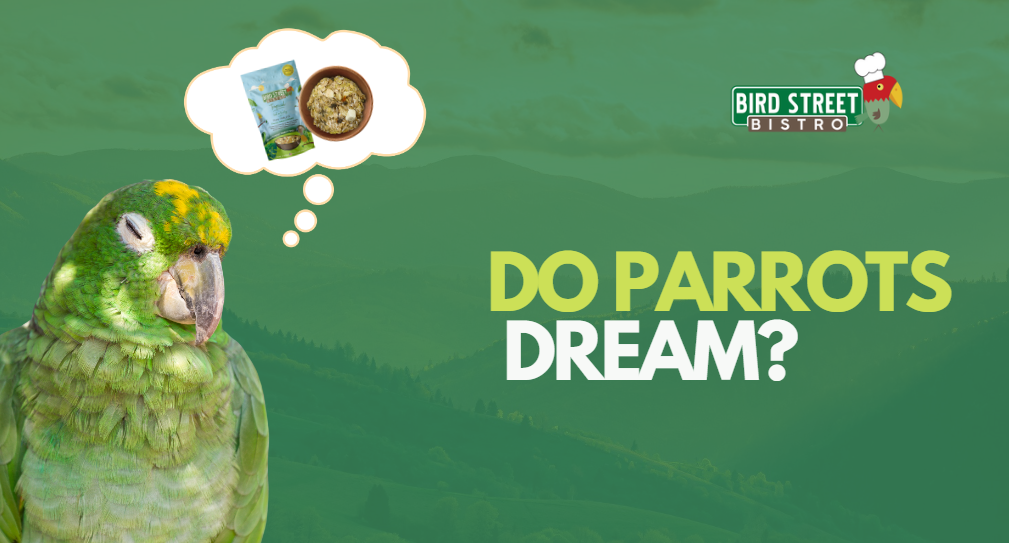Do Parrots Dream?
If you’ve got a parrot in your home, you might have responded to the title of this article as “Yes, my parrot absolutely dreams!” That’s because many people sleep with their parrots close by at night and have heard them chattering or behaving in ways that you wouldn’t expect from a sleeping bird. Although my and other parrot owner’s experiences may be purely anecdotal, scientists have actually studied birds and their sleep processes to find out if they experience similar sleep patterns to humans and come up with some fascinating answers. I’d like to take a look at research that was conducted and led by Professor Onur Güntürkün, head of the Biopsychology Department and his team at Ruhr University Bochum to see what they found. But first, let’s get a better idea of what a dream actually is.
Dreams - How and Why Do We Do It?

Before modern science, many humans believed that dreams were communications from the gods or omens given to us by some kind of higher beings in order to guide us or prevent disaster. Ancient records have been found such as dream-books, books that listed symbols that could be found in a dream, assigning meanings to those symbols to help a person interpret them and apply them to their lives. Dreams were often seen as messages that often required some kind of interpretation. Those that could interpret their meanings were usually seen to have some kind of divine influence such as a priest or a seer. The Greeks believed that dreams were messages that could also foretell the future.
Even today, you can find books and websites devoted to the interpretation of dreams and guides on how to use the symbols or situations contained in them to extract meaning. The authors of these books could be seen as trying to provide the meaning behind dreams. Scientists still don’t know for sure why we do it. There’s a lot of compelling theories backed up by studies and data. But the truth is, there is still no absolute answer to the question of “why?” However, we are starting to learn more about how dreams happen.
During sleep, humans go through different phases of sleep. One of those stages is called Rapid Eye Movement or REM sleep. It is during this stage of sleep that most of our dreaming occurs. But dreams can also occur during non-REM sleep.

Theories surrounding the details of dream creation and processing have changed and evolved as science and technology advances. I’m not going to go into a lot of detail, but in general, it appears that the entire brain is active when we are dreaming. Research is still being conducted, but Eleanor Maguire of University College London and her team reported that they believe dreams might be shaped by networks in the brain similar to those involved in recalling memories and creating scenarios while a person is awake. Other researchers have been studying dreams and our brains and answers are likely to continue to come in and change as more research is conducted.
What About Birds?

So, what about birds? Do they dream as humans do? Professor Onur Güntürkün, head of biopsychology research at Ruhr University in Bochum in Germany and his team decided to take a look at pigeons in order to learn about avian sleep patterns.
In the study that was published in 2023, they took 15 pigeons and used infrared video cameras and functional magnetic resonance imaging (fMRI) to observe their sleeping and wakeful states. The birds were carefully trained over time and slowly acclimated to the devices used in the study in order to reduce the amount of stress they would experience. During the bird’s REM sleep stage, they noticed a lot of activity in the part of the bird’s brain that is responsible for visual processing to analyze movement of their surroundings during flight. They also noticed activity in the parts of their brain that processes signals from their wings. Mehdi Behroozi, part of the research team said that “Based on these observations, we think that birds, just like humans, dream during REM sleep, and might be experiencing flight in their dreams.”
The study found that the birds they looked at showed similar sleep patterns to mammals, and as with humans humans, that their brains also appear to be very active while they are dreaming. Professor Onur Güntürkün stated that “The last common evolutionary ancestor of birds and mammals dates back about 315 million years, to the early days of land vertebrates, yet the sleep patterns in birds are remarkably similar to those in mammals, including both REM and non-REM phases.” The study describes some of these similarities as “remarkable”.
Parrot Owners Describe their Bird’s Dreams

Let us put the scientific stuff aside now and indulge in some anecdotal fun. Parrot owners all over the internet have shared some pretty funny and interesting stories about their bird’s behavior while they sleep. Some people have described their birds as vocalizing to themselves by talking and singing. Others have claimed that their bird has dreams that seem to be frightening to them, resulting in them seeking reassurance in the middle of the night. I, myself, have a parrot that sleeps in the same room as me. His name is Noel, he is a Green-cheeked conure rescue and is about 17 years old. Every night, at least once or twice, he can be heard softly talking to himself, followed by whining until he seems completely awake. Then, he says “baby” over and over until I say it back before falling back asleep. I also have a Sun conure that makes soft kissing noises in her sleep at times.
Those are some of my experiences, but it’s always fascinating to read what others have to say about the birds in their care and their behaviors. Looking around the internet or asking fellow bird owners about what they think about their parrots dreams can produce some interesting results. I asked our local Parrot Rescue group on Facebook to share some of their interesting nighttime experiences with me. Here are some of them:
“My newest girl "Piper" talks, laughs, quacks, barks in her sleep as well as other noises. Her head is tucked under her wing when she does this. She also does this during the day when she naps.” - JL
“I have a blue and gold macaw named Buddy Boo. He will be sleeping and some nights he will laugh and giggle. A couple of nights he will wake up screaming and like a good mom, I run and pick him up because he would be breathing fast. It took me a while to get used to it, but it's amazing to know that birds dream just like us.” - Karina
“My cockatiel sleeps with her head down below (the) perch like a plane doing a nose dive.” - Andrea
“While (Fredo) sleeps he makes lil chirping noises and whining noises” - Yvonne
“My gray coughs like a man. First time I heard that in the middle of the night was frightening lol. My too (cockatoo) makes soft little whimpers.” - Victoria
Did you know that Bird Street Bistro offers parrot tea? The calming and anti-inflammatory properties in our organic herbal parrot tea will help enhance your parrot's life - and maybe their sleep as well. We recommend our Halcyon Parrot Tea!
References:
Hughes, J. Donald. “Dream interpretation in ancient civilizations.” Dreaming, vol. 10, no. 1, Mar. 2000, pp. 7–18, https://doi.org/10.1023/a:1009447606158.
Wamsley, Erin J. “How the brain constructs dreams.” eLife, vol. 9, 8 June 2020, https://doi.org/10.7554/elife.58874.
Ungurean, Gianina, et al. “Wide-spread brain activation and reduced CSF flow during avian REM sleep.” Nature Communications, vol. 14, no. 1, 5 June 2023, https://doi.org/10.1038/s41467-023-38669-1.
- Choosing a selection results in a full page refresh.
- Press the space key then arrow keys to make a selection.


